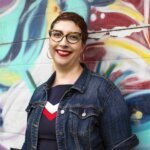It was the kid with the cleats that won me over first. He looked kind of like Michael Cera’s character in Juno — earnest and slightly shaggy, with clear skin and soft eyes. The other teens in the room were no less endearing — one girl with a pixie cut, clutching a giant stuffed bear, another soft-spoken boy with hair dyed blue-black, glossed lips and fingernails painted with dark polish.
I was speaking at a regional gathering of students involved in gay-straight alliances in their high schools. It was a funny moment for me to realize that even though I may be 15 to 20 years younger than the majority of my co-workers, I am still a day-job and mortgage-holding woman who’s pushing 30.
And despite the fact that I own Superman underwear and use the word “dude” as a part of regular conversation, I am no longer considered “youth.” I am almost 15 years older than your average high school student, and though my advice is often sought out as a “young activist,” I really have no street cred when it comes to the realities of being a queer teen in 2008.
And the truth is I wasn’t ever really a gay adolescent myself. I came out on the cusp of turning 20, and my early lesbian adventures took place after I had left home and begun university in Montreal. Sure, I’d always been surrounded by queers. My brother came out at 13, and I was a theatre major in an arts-focussed high school. If my own emotional histrionics weren’t enough, I was surrounded by my fair share of drama queens. I’d need more than two hands to count all of my former high school classmates who came out in the years after graduation. At the time, I knew that the hallways near the music and drama studios were safe spaces for me and my friends — even if I didn’t know I was a dyke at the time.
The teens I met at the GSA meeting last month came from all over the city, and some rural areas. One young woman had taken a bus for an hour, and then driven another hour into the city, just to be around other like-minded kids. She asked me how I thought she could help promote diversity in a small white-bread school, where some students are still driven to class every day in tractors.
She’d tried putting up posters, but they had been torn down. And she could only seem to get a couple of people to come to her monthly meetings. A big smile crept across her face when I told her that the last meeting of Ottawa Dyke March organizers that I attended only attracted four people. But I reminded her that if you multiply the three people at her school, with the handfuls of kids at other Ottawa schools, they had a real force for change on their hands.
The boy in the cleats lit up and told me about the movie nights and panel discussions he’d helped organize, and then asked me eagerly how he and his friends could help support the Dyke March.
This is when I realized something that should have been clear to me when I first walked in the door. Most of these kids don’t identify as gay. (These are teens from gay-straight alliances, after all.) They just don’t feel like they fit into the mainstream, and feel driven to make high school a better place for the gay and trans people they know.
“I wish I had been around for the race riots or women’s liberation,” said Cleat Boy. “I don’t understand how everyone isn’t interested in fighting for human rights. It’s just the right thing to do.”
Yes, those words came out of the mouth of a straight 17-year old boy. Who knows? Maybe he’ll come out when he gets older. Or maybe not. Either way, it bodes well for the generation of young people that are poised to succeed the Baby Boomers.
I didn’t have much advice for the room full of high-school keeners. I told them to be good to their friends and to avoid wasting their energy on jerks. That it’s okay to live in the bubble sometimes to help conserve your resources for the more important battles. I suggested that they form alliances with the other social misfits and do something fun like throw a dance party. Everyone likes a party, and they don’t have to know it’s a gay party until they are in the middle of it and having too much fun to care.
I encouraged them to think about the concept of solidarity, and to understand that sometimes the best way to support our friends from other communities is to let them speak for themselves. But mostly, I reminded them that high school only lasts so long, and that when it’s over, things are so much better. But they already know that.
Read recent columns by Ariel Troster:
-
Fresh face, old fight — Apr 23, 2008 -
Why gays should worry about policing pregnancy — Apr 2, 2008 -
Fetus rights part of SoCon chess game — Mar 12, 2008 -
Why we fight alongside hookers — Feb 21, 2008 -
Bio family can embrace chosen family — Jan 30, 2008 -
Lessons learned in campus activism — Jan 9, 2008 -
How having three roomies proved a good move — Dec 20, 2007

 Why you can trust Xtra
Why you can trust Xtra


